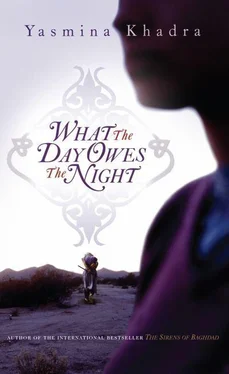We said what we had to say to each other, which was not very much – nothing we did not already know.
‘It’s not good for you to be here,’ she announced.
At the time, I did not understand what she was saying. I was a child; to me, words were simply sounds you made with your lips. Did I take them in, did I think about them? Besides, what difference did it make? I was already elsewhere.
It was my mother who reminded me that my uncle was waiting outside, that it was time for me to go, and the eternity we had shared winked out so quickly – like a light bulb when you flick the switch – that it caught me unawares.
Beyond the curtain, the courtyard was silent. There was no fighting, no screaming – had they been eavesdropping on our conversation? As I stepped out I saw most of our neighbours gathered around the edge of the well: Badra, Yezza, Batoul the clairvoyant, the beautiful Hadda, Mama and her children. They stood, staring at me from a safe distance, as though terrified that I would break if they came closer. Badra’s boys hardly dared to breathe – these two little savages stood with their arms stiffly by their sides. All it had taken to confuse them was a change of clothes. Even now, I wonder if the world is nothing but appearances. A man with a face as grey as papier mâché wearing a crude jute tunic over his empty belly is a pauper, but wash his face, comb his hair, give him a pair of clean trousers and he is a different man. Everything is in the details. At the age of eleven, these are the things that puzzle you, and since you can find no answers, you settle on answers that are convenient. Poverty, I decided, had nothing to do with fate; it was simply a state of mind. We accept the world as we see it; we believe it to be immutable. But if we look away from the misery even for a moment, another path appears, bright as a new penny, and so mysterious that we begin to dream . . . The people of Jenane Jato did not dream; they had decided that their fate was sealed, that there was no way up, no way out. Years of poverty had left them blinkered.
My uncle held out his hand. I grabbed it. The moment his fingers closed around my wrist, I stopped looking behind me.
I was already elsewhere.
* * *
The first year I lived with my adoptive parents passed without incident. Relieved, my uncle enrolled me in a school two blocks from our house. It was an unremarkable building with bare corridors and tall plane trees in the playground. It seemed perpetually dark, as though the sunlight barely reached the roof of the building. Unlike the stern, austere man who taught us French (in a thick Auvergne accent some of the pupils could imitate perfectly), the other teacher was gentle and patient. A plump woman who always wore the same drab pinafore, she would walk up and down between the desks trailing a cloud of perfume behind her like a shadow.
The only two other Arab boys in my class, Abdelkader and Brahim, were both sons of diplomats and had servants who came and picked them up after school.
My uncle took a keen interest in my studies; I was the apple of his eye. His joy gave me confidence. From time to time he would invite me into his study and tell me stories whose meaning and import I did not understand.
Oran was a beautiful city. There was something unique about the place, a charm that was more than simply Mediterranean exuberance. It was brash and vital and alive. When evening came, the city was magical. The air was cool after the sweltering heat of the day, and people would set chairs out on the pavement and spend long hours chatting over a glass of anisette. From our veranda we could see the glow of their cigarettes, overhear their conversations; their scandalous stories streaked across the darkness like shooting stars, their throaty laughter crashed at our feet like waves on a beach.
Germaine was happy. Every time she looked at me she offered up a prayer of thanks. I could see how happy I made her and her husband, and I felt flattered.
Sometimes my uncle entertained guests from out of town, Arabs and Berbers, some in European suits, others in traditional dress. They were distinguished, eminent people who talked about some country called Algeria. This was not the same country they taught us about at school, nor the one people talked about in the posh neighbourhoods, but a country that had been ravaged, conquered, silenced; a country that gnawed on its anger like rotting meat. These men talked about the Algeria of Jenane Jato, about the yawning gulf between rich and poor, about whipping boys and scapegoats . . . they talked about a country that was yet to be redefined, a country in which every paradox seemed to live a life of ease.
I think I was happy at my uncle’s house. I did not miss Jenane Jato. I had a friend who lived across the road. Her name was Lucette. We were in the same class and her father allowed her to play with me. She was nine; she was not pretty, but she was sweet and generous and I loved being with her.
At school, things settled down in my second year. I managed to blend in with everyone else. I still found roumi children to be strange creatures – they could be all smiles one minute and snub you the next. In the playground they would sometimes fall out with each other, declare themselves sworn enemies, but the moment an interloper appeared – usually an Arab or a ‘poor relation’ from their own community – they joined forces against him. They would ignore him, mock him, bully him. At first, they sent Maurice, a stupid, brutish boy, to bully me. Once they realised I was a ‘sissy’ who would not fight back and would not tell tales, they left me alone. They moved on, found another scapegoat, and now they would tolerate me on the periphery of their group. But I was not really one of them – a fact they were quick to remind me of. Strangely, my chief weapon if I wanted them to be my friends was my lunchbox. The moment I opened it, they would crowd round and treat me with disarming respect. But as soon as I had shared out my food and the last crumb had been eaten, they turned their backs so fast it made my head spin.
One afternoon, I arrived home from school in a rage, fuming at Maurice, at my teacher, at the whole class. I needed answers and I needed them now. Something had happened to undermine my self-assurance; for the first time I realised that my self-respect did not depend solely on those close to me, but on people whom I did not even know. It had happened during class. We had all handed in our homework, all except Abdelkader, who was embarrassed because he had forgotten to do it. The teacher dragged him to the front of the class by the ear and said: ‘Would you like to tell us why, unlike your friends, you have no homework to give me, Monsieur Abdelkader?’ The boy kept his head down, flushed with humiliation. ‘Why, Monsieur Abdelkader? Why have you failed to do your homework?’ When he got no response, the teacher turned to the rest of us. ‘Can anyone in the class enlighten me as to why Monsieur Abdelkader did not do his homework?’ Without bothering to put his hand up, Maurice yelled: ‘Because Arabs are lazy and shiftless, sir.’ The whole class had erupted with laughter and this had set me brooding.
As soon as I got home, I went and found my uncle in his study.
‘Is it true that Arabs are lazy and shiftless?’
My uncle was surprised by the anger in my voice. He set down the book he had been reading and turned to me. What he saw on my face moved him to pity.
‘Come here a minute, son,’ he said, opening his arms.
‘No . . . I want to know if it’s true. Are Arabs lazy?’
My uncle took his chin between thumb and forefinger and looked at me. He realised that I was serious, that he owed me an explanation.
He thought for a moment, then sat opposite me and said:
Читать дальше












